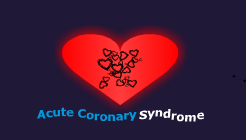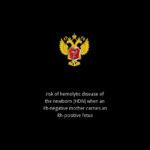Acute Coronary Syndrome
Acute coronary syndrome is a medical term applied to a group of conditions associated with sudden reduced myocardial perfusion, and accompanied by a group of clinical symptoms, which usually begin abruptly, typical symptoms include angina or midsternal chest pain and discomfort, often described as tightness or aching pressure that often radiates from the chest to the shoulders, arms, neck, lower jaw, back or abdomen. less specific common symptoms of ACS include dyspnea, dizziness, lightheadedness, sweating, nausea or vomiting. Rarely, syncope may also present.[1][8][9]
Risk factors for ACS include drug abuse, arrhythmias (abnormal heart rhythms), and heart disease.[12]
Classification
- Unstable angina.
- Non–ST-segment elevation MI (NSTEMI).
- ST-segment elevation MI (STEMI).
- Sudden cardiac death.
Common Causes
- Pericarditis (acute viral Pericarditis, or recurrent pericarditis in alcoholics).
- Rheumatism
- Atherosclerosis
- Bad lifestyle habits and drug addiction (addiction on muscle simulators, Viagra, cocaine, etc.)
- Genetic factors (genetic predisposition).
- Heart attack survivor
- Cor pulmonale
- Lung diseases (obstructive lung disease, Pulmonary hypertension, emphysema, etc.)
Symptoms
The presentation of unstable angina and NSTEMI may be indistinguishable, as angina and discomfort may be associated with sweating, dyspnea and palpitations, which can make it harder to diagnose. The same applies to STEMI and NSTEMI, as both of them are usually characterized by an abrupt onset with a pattern of nonspecific symptoms, which may coincide with other specific symptoms such as chest pain, discomfort, and anxiety. Typical symptoms of unstable angina may suddenly develop while you’re at rest or while doing a simple task.[1][13]
Acute cardiopulmonary arrest is the foremost presentation of ACS, it is characterized by loss of consciousness, apnea, and bradycardia, as the heart suddenly stops pumping the blood (Sudden cardiac arrest).
ACS is a life-threatening emergency that require prompt recognition of ACS symptoms for an accurate diagnosis, therapy should not be delayed, as delay in treatment can be deadly. Delayed treatment may lead to increased injury and can be associated with or lead to severe heart attack. Acute coronary syndrome may have a poor prognosis without prompt and adequate therapy.[1]
It’s significant to consider the following manifestations of ACS, and never hesitate to call 911 or a nearby hospital if you suspect an acute coronary syndrome, especially if you have any of the following symptoms of ACS:
- Midsternal chest pain (angina), felt at the front of the chest and ranging from a sharp stab to a dull ache.[1]
- Discomfort and aches, often described as tightness or aching pressure that often radiates from the chest to the shoulders, arms, neck, lower jaw, back or abdomen.
- Nausea and vomiting
- Coma, a cardiogenic syncope that occasionally result from cerebral hypoxia or anoxia secondary to cerebral hypoperfusion (reduction in blood flow due to hypotension).[2][3][4]
- Dyspnea often described as an intense tightening in the chest, with air hunger (shortness of breath).
- Diaphoresis, expressed as sudden, and excessive sweating
Diagnosis
Clinical Presentation, evaluating the clinical signs for symptoms of ischemia.
Past Medical History, obtaining a thorough history disease and evaluating risk factors such as prior history of coronary artery disease (CAD), sex, age, and presence of risk factors for ACS.)[1]
ECG Changes which include changes in the PR segment, the QRS complex, and the ST-segment, and evaluating these changes.[5][10]
The diagnosis of acute coronary syndrome is commonly made in an ER or an urgent care clinic. Acute coronary syndrome is treatable if diagnosed early, as the nature of medications can only be determined in accordance with the changes and development of further symptoms.[1]
Treatment
Key components in the management of ACS include:
Coronary revascularization, when indicated
Antiplatelet and anticoagulation therapy, prompt initiation of dual antiplatelet therapy and anticoagulation (low-dose aspirin and clopidogrel), Clopidogrel (plavix) is an oral, antiplatelet drug used to reduce the risk of blood clots forming in patients with ACS.[14][15][16]
Immunosuppressants and cardioprotectors, consideration of immunosuppressants including β blockers (metoprolol, atenolol, propronolol, etc.), ACE inhibitors (captopril, enalapril), and statins (digoxin, atrovastin, levostatin, etc.). Amiodarone is the drug of choice for patients with ACS and ventricular arrhythmias (VTA).[17][18][19]
Surgery and pro-surgical diagnostic methods
Provided that medicament’s aren’t sufficient to restore blood movement through your heart, your specialist might prescribe one of these methods:
Balloon Angioplasty and stents, inserting a long catheter tube into the blocked or narrowed part of the arteries, following a wire with a twinkled head, in the shape of a balloon is passed through the catheter to reach the narrowed or blocked artery. The balloon is then inflated to open the artery or vein. finally, a stent or a cross section tube is inserted and left inside of the artery to improve the blood supply to that area. The procedure might take longer if many stents are inserted into more than one artery.
Coronary Artery Bypass Graft Surgery or Coronary detour surgery. To reroute blood around the blocked section through a detour or bypass.
Prognosis and life modifications
People with Acute coronary syndrome need special care, and usually require lifelong modifications, as patients with ACS have a slightly increased risk of developing cardiovascular diseases, such as strokes and heart failure. Aged patients suffer worse outcomes, especially that they are much more likely to have multi risk factors.
Expert Tips for patients with ACS
- A low-fat diet, restrict consumption of animal fat, saturated fat and cholesterol, as a low fat diet leads to effective fast slimming, speedy loss of body fat.[1]
- Low-carbohydrate diet, to treat or prevent cardiovascular disease from getting worse [6]
- Low physical activity (walk less than 200 meters or limit stair climbing to less than five floors per day)
- Omega 3/ Omega 6 rich foods
- Diet number 7 (restriction of salt intake to less than grams per day)[1]
- Fiber rich diets
- Aspirin, in an antiplatelet dose of 0.3g per day is recommended in patients with suspected Acute coronary syndrome.[7]
- Nitroglycerin, a sublingual tablet intended for fast relief of angina and pain; however, headache may occur immediately after taking Nitroglycerin pills.
References
Acute Coronary Syndrome
Verified by: Dr.Diab (July 19, 2018)
Citation: Dr.Diab. (July 19, 2018). Acute Coronary Syndrome Practice Guidelines Diagnosis and Treatment. Medcoi Journal of Medicine, 21(2). urn:medcoi:article3101.














There are no comments yet
Or use one of these social networks